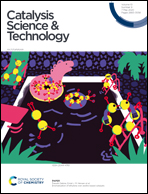Deactivation and regeneration of carbon supported Pt and Ru catalysts in aqueous phase hydrogenation of 2-pentanone†
Abstract
Aqueous phase conversion of biomass-derived molecules requires development of catalysts and operating strategies that create viable operation for extended performance as necessitated for industrial applications. While structural collapse of the support and sintering/leaching of the supported metal particles have been reported in the literature as being the primary deactivation mechanisms, carbon deposition was found to be the dominant deactivation mode for carbon supported Pt catalysts in aqueous phase 2-pentanone hydrogenation reactions. A mild regeneration method involving air oxidation at 200 °C and H2 reduction at 180 °C led to full recovery of the catalytic activity. The regeneration method was also successfully applied to Ru catalysts leading to the full recovery of the activity. The mild regeneration method demonstrated likely has applicability to catalyst regeneration for additional aqueous phase reactions with oxygenated molecules.



 Please wait while we load your content...
Please wait while we load your content...